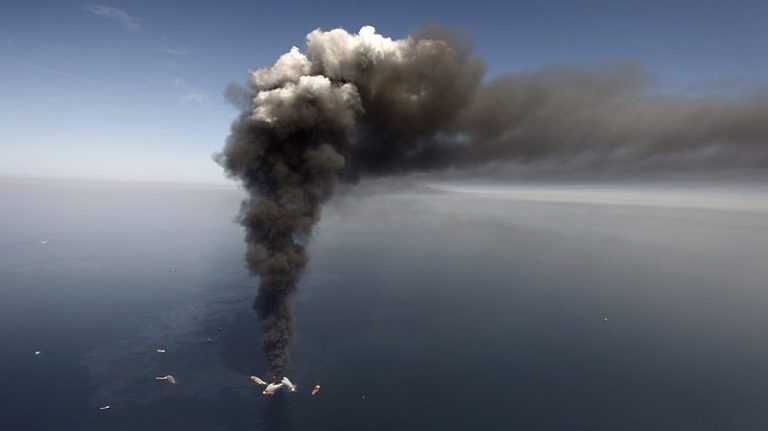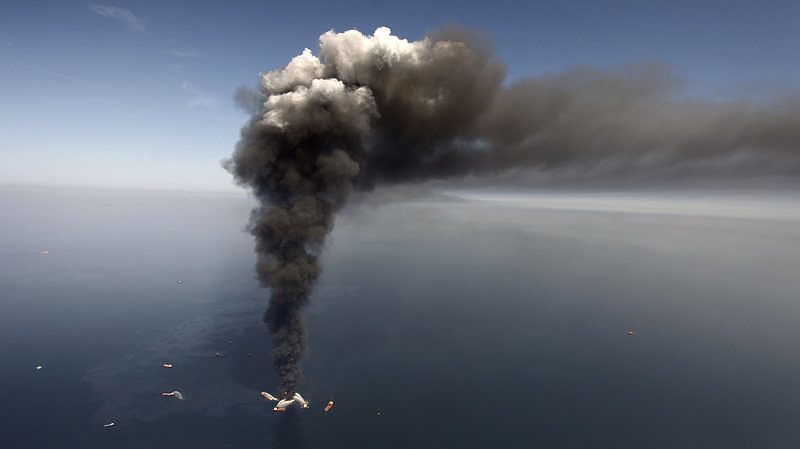Historic Petition Urges Obama to Halt All New Offshore Fossil Fuel Leases
By: Waterkeeper Alliance

More Than 45 Organizations Back Historic Legal Petition That Takes Aim at Ocean-drilling Damage to Climate, Wildlife, Communities
WASHINGTON— More than 45 climate, conservation, indigenous and coastal organizations representing the major coastal regions of the United States filed a legal petition today calling on President Obama to align U.S. energy policy with his climate goals by issuing an executive order to end new oil and gas lease auctions in federally controlled oceans — including the Arctic, Atlantic and Gulf of Mexico.
The order, under the authority of the Outer Continental Shelf Lands Act, would make federally managed waters that have not already been leased to industry unavailable for new leases. Halting new fossil fuel leases on more than 1 billion acres off America’s coasts would keep up to 62 billion tons of carbon emissions in the ground — the pollution equivalent of more than 16,000 coal-fired power plants.
The order would be a step toward limiting global warming to 1.5 degrees Celsius above pre-industrial levels, consistent with the 2015 Paris Agreement, by preventing the leasing of new offshore oil and gas. To stay within the 1.5 degree limit, the vast majority of known fossil fuels must remain unburned and kept safely in the ground.
The petition, led by the Center for Biological Diversity, comes on the heels of the administration’s proposed five-year plan governing future federal offshore oil and gas leasing. The proposal would expand leasing in the Arctic and Gulf of Mexico, risking more disastrous spills, putting wildlife and communities in harm’s way and deepening U.S. dependence on the fossil fuels that are driving the global climate crisis.

Despite its name, leases outlined in the five-year program would allow for oil and gas production over the next 40 to 70 years, long past the point that scientists say fossil fuels should be phased out. Continuing to rely on fossil fuels decades into the future undermines a rapid and essential transition to renewable energy. The petition calls on President Obama to align federal leasing policy with U.S. climate change goals while promoting a rapid transition to a clean energy economy, starting with a halt in offshore leasing.
Groups joining today’s petition are the Center for Biological Diversity, Food and Water Watch, Friends of the Earth, Greenpeace, Oil Change International, Rainforest Action Network, Waterkeeper Alliance, Alaska Inter-Tribal Council, Alaska Rising Tide, Altamaha Riverkeeper, Apalachicola Riverkeeper, Assateague Coastal Trust, Atchafalaya Basinkeeper, Cahaba Riverkeeper, California Coastal Protection Network, Chesapeake Climate Action Network, Clean Ocean Action, Cook Inletkeeper, Courage Campaign, Crystal Coast Waterkeeper, Emerald Coastkeeper, Environmental Defense Center, Environmental Youth Council, Eyak Preservation Council, Friends of Matanzas, Gulf Restoration Network, Institute for Fisheries Resources, Kootenai Environmental Alliance, Living Rivers, Louisiana Bucket Brigade, Matanzas Waterkeeper, Miami Waterkeeper, Native Conservancy (Land Trust), Ocean Conservation Research, Pacific Coast Federation of Fishermen’s Associations, Preserve Our Wildlife, Prince William Soundkeeper, Resisting Environmental Destruction on Indigenous Lands (REDOIL), Riverkeeper, Sea Turtle Oversight Protection, Seneca Lake Guardian, Suncoast Waterkeeper, Turtle Island Restoration Network, Wabash Riverkeeper Network, Whale and Dolphin Conservation, WILDCOAST and WildEarth Guardians.
Download the petition.
Statements from petition signatories:
“President Obama recognized oil drilling off the Atlantic coast was a bad idea. But the same logic — that we must protect our climate, wildlife and coastal communities from oil spills and carbon emissions — holds true for all ocean coasts,” said Miyo Sakashita, oceans program director at the Center for Biological Diversity. “So we’re calling on the president to honor his climate change pledges and end future fossil fuel leasing from all federal offshore areas.”
“President Obama has acknowledged that in order to prevent climate catastrophe, we must transition away from dirty fossil fuels and keep the vast majority of them in the ground. He has the authority to drive that transition by permanently protecting our public waters from oil and gas exploitation,” said Marissa Knodel of Friends of the Earth. “To cement his climate legacy and honor his administration’s climate goals, President Obama should not offer any new leases in the 2017-2022 offshore drilling program and withdraw all federal offshore areas from future leasing.”
“It’s time to stop the corporate giveaway of public lands and waters. Obama has the power to create real, lasting change by ending the fossil fuel leasing program. An executive act would cut 25 percent of U.S. climate change emissions and set the stage to transition beyond fossil fuels,” said Amanda Starbuck, program director for Rainforest Action Network.
“President Obama must apply a climate test to offshore drilling and the rest of our energy policy. When he does, he’ll see that offshore drilling fails that climate test,” said David Turnbull, campaigns director at Oil Change International.
“Any areas being opened up for leasing now will not even begin producing oil and gas for at least five years. By then we should be well on our way toward ending destructive fossil fuel extraction, not adding new rigs,” said Marc Yaggi, executive director of Waterkeeper Alliance. “By focusing our investments on a clean-energy future, the Obama administration will secure its climate legacy, ensuring economic and environmental resilience for future generations.”
“The recent Refugio Oil Spill off the coast of California reminds us of the inevitable risks of offshore oil and gas development,” said Linda Krop, chief counsel of the Environmental Defense Center. “These risks are compounded by the devastating and long-lasting effects of climate change on our coastlines, communities, wildlife and public health.”
“Alaska stands on the front lines as an Arctic region whose ecosystems and communities are some of the most dramatically affected by climate change,” said Stephen Jolley of Alaska Rising Tide. “If we are committed to social justice and equality for all, we must act as allies to those communities whose social and spiritual health relies on their continued relationship to the land by halting operations that would send our bountiful home into further decline.”
“From sea level rise and extreme storms fueled by climate change, to coastal erosion, to frequent spills and accidents, the people of the Gulf of Mexico are on the frontline of the impacts from the oil and gas industry,” said Cynthia Sarthou, Executive Director of the Gulf Restoration Network. “Even after the BP disaster, the industry and its political allies continue to actively resist new safety reforms. It is time for the President to end new offshore leasing and promote a transition to a more stable, sustainable and equitable economy for our communities and climate.”
“While we were glad President Obama listened to the communities and citizens of the Atlantic coast and removed that area from offshore leasing, our work is not done,” said Matanzas Riverkeeper Neil A. Armingeon. “We must support those who continue to fight oil and gas development in their communities, and we hope President Obama will once again do what’s right and end new leasing in the Gulf and the Arctic.”
Background
The American public owns nearly 650 million acres of federal public land, and more than 1.7 billion acres of Outer Continental Shelf (the oceans between 3 and 200 miles off the coast) — and the fossil fuels beneath them. This includes sensitive oceans and coastlines, including Alaska’s Chukchi Sea, the Gulf of Mexico and the Eastern Seaboard. These places and fossil fuels, held in trust for the public by the federal government, are administered by the Department of the Interior for potential leasing.
Over the past decade, the combustion of federal fossil fuels has resulted in nearly a quarter of all U.S. energy-related emissions. An August report by EcoShift consulting, commissioned by the Center for Biological Diversity and Friends of the Earth, found that remaining federal oil, gas, coal, oil shale and tar sands that have not been leased to industry contain up to 450 billion tons of potential greenhouse gas pollution. Burning the recoverable oil and gas under federal waters would release 61.5 billion tons of greenhouse gases into the atmosphere, the equivalent of driving 13 billion passenger cars for one year. As of this year, 67 million acres of public fossil fuels were already leased to industry, an area more than 55 times larger than Grand Canyon National Park and containing up to 43 billion tons of potential greenhouse gas pollution.
Last year Sens. Merkley (D-Ore.), Sanders (D-Vt.) and others introduced legislation to end issuance of new federal fossil fuel leases. Days later President Obama canceled the Keystone XL tar sands pipeline, saying, “Because ultimately, if we’re going to prevent large parts of this Earth from becoming not only inhospitable but uninhabitable in our lifetimes, we’re going to have to keep some fossil fuels in the ground rather than burn them and release more dangerous pollution into the sky.”
Download a letter from more than 400 groups and climate leaders urging President Obama to halt new federal fossil fuel leasing.
Download Grounded: The President’s Power to Fight Climate Change, Protect Public Lands by Keeping Publicly Owned Fossil Fuels in the Ground (this report details the legal authorities with which a president can halt new federal fossil fuel leases).
Download The Potential Greenhouse Gas Emissions of U.S. Federal Fossil Fuels(this report quantifies the volume and potential greenhouse gas emissions of remaining federal fossil fuels).
Download The Potential Greenhouse Gas Emissions fact sheet.
Download Public Lands, Private Profits (this report details the corporations profiting from climate-destroying fossil fuel extraction on public lands).
The Center for Biological Diversity is a national, nonprofit conservation organization with more than 990,000 members and online activists dedicated to the protection of endangered species and wild places.
Contact:
Miyoko Sakashita, Center for Biological Diversity, (510) 844-7108, miyoko@
Marissa Knodel, Friends of the Earth, (202) 222-0729, [email protected]
Virali Modi-Parekh, Rainforest Action Network, (510) 747-8476, [email protected]
Tina Posterli, Waterkeeper Alliance, (212) 747-0622 x 113, [email protected]
David Turnbull, Oil Change International, (202) 518-9029, [email protected]